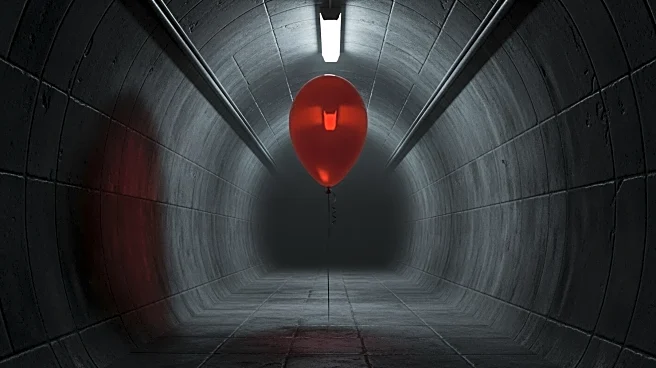What's Happening?
HBO is set to premiere a new prequel series titled 'It: Welcome to Derry,' expanding the universe of the popular horror franchise 'It.' The series debuts on October 22, 2025, on HBO and HBO Max, featuring
a storyline set in 1962. It follows a couple moving to Derry, Maine, with their son, coinciding with the mysterious disappearance of a local boy. The show aims to delve into the origins of Pennywise the Dancing Clown, portrayed by Bill Skarsgård, who reprises his role from the 2017 and 2019 films. Directed by Andy Muschietti, the series will consist of eight episodes, airing weekly through December 14, 2025.
Why It's Important?
The release of 'It: Welcome to Derry' is significant as it continues to build on the success of the 'It' franchise, which has garnered a substantial fan base and critical acclaim. By exploring the backstory of Pennywise, the series offers fans deeper insights into the character's origins and the town's dark history. This expansion of the 'It' universe could potentially attract new viewers to HBO Max, boosting subscriptions and viewership. Additionally, the series contributes to the growing trend of horror-themed content in mainstream media, reflecting the genre's increasing popularity and influence.
What's Next?
As 'It: Welcome to Derry' unfolds, viewers can expect further exploration of Derry's sinister past and Pennywise's impact on the town. The creators have envisioned a three-season storyline, with potential future seasons set in 1935 and 1908, continuing the 27-year cycle theme. This long-term plan suggests sustained interest and investment in the franchise, potentially leading to more spin-offs or related content. The series may also prompt discussions among fans and critics about its narrative choices and how it aligns with the established lore of the 'It' films.
Beyond the Headlines
The series not only expands the 'It' narrative but also highlights the cultural fascination with horror and supernatural themes. It raises questions about the ethical implications of exploiting fear and trauma for entertainment. Additionally, the show's setting in the 1960s may offer commentary on historical social issues, subtly weaving them into the horror narrative. This approach could enrich the storytelling, providing layers of meaning beyond the surface-level scares.









